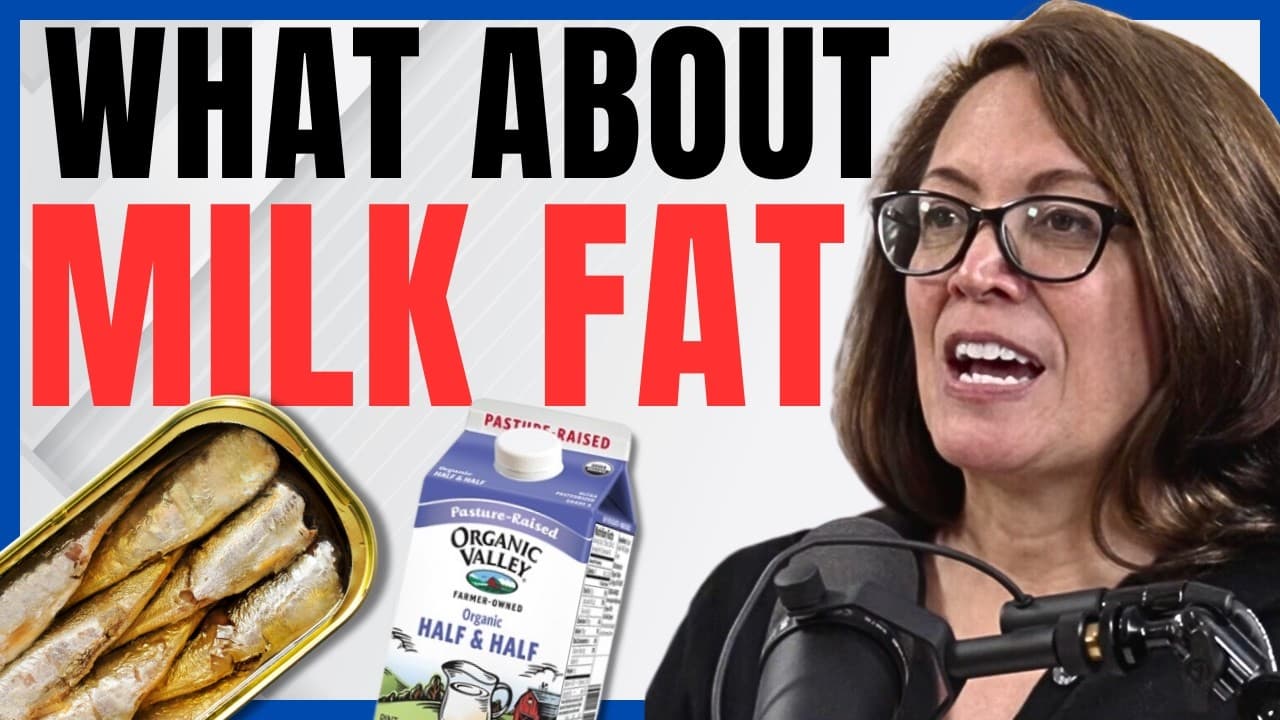New Compound Discovered is Stronger than Omega 3 for Longevity & Metabolic Health | Dr. Venn Watson
27 Aug 2024 (over 1 year ago)

Intro (0s)
- Omega-3 fatty acids are beneficial, but consuming too much can be detrimental. (11s)
- Omega-3s are polyunsaturated fatty acids, meaning they contain multiple double bonds, making them flexible but susceptible to oxidation. (49s)
- The more double bonds a fatty acid has, the more vulnerable it is to oxidative damage, also known as lipid peroxidation. (1m22s)
Oxidation, Rancidity & Lipid Peroxidation (1m30s)
- It is difficult to determine if fish oil has gone rancid, but testing has shown that a significant portion of fish oil supplements on the market have levels of lipid peroxidation that exceed international safety standards. (2m25s)
- Consuming oxidized omega-3s may not provide the same health benefits as non-oxidized omega-3s, and there is a possibility that they could have negative effects on health. (2m56s)
- While omega-3s have been shown to decrease oxidized LDL cholesterol, this benefit may be lost if the omega-3s themselves are oxidized. (4m10s)
Sustainability (4m37s)
- It is unsustainable to rely on fish as a source of Omega-3 due to the state of the ocean. (4m45s)
- Omega-3 fish oil supplements are generally ineffective at decreasing heart disease. (6m32s)
- Eating fish as a whole provides more nutrition such as protein and Omega-3s, and it is important to preserve fish for diets rather than extracting oil. (6m58s)
Omega-3s & Omega-6s (7m15s)
- Omega-3 and Omega-6 essential fatty acids were discovered by Mildred and George Burr, a husband-and-wife research team, in the 1900s. (7m26s)
- The discovery of essential fatty acids stemmed from an experiment where mice deprived of these nutrients developed scaly tails, a condition termed "rotten tail syndrome." (7m47s)
- While Omega-3 and Omega-6 remain necessary for human health, future research may reveal that they are not as "essential" as previously believed, and alternative sources beyond fish might exist. (8m53s)
Fats to Support Cell Membrane Health (9m3s)
- Cell health is increasingly important, and maintaining the cell membrane, which acts as a protective layer, is crucial for overall cellular well-being. (9m25s)
- The types of fatty acids present in the cell membrane influence its health; a higher proportion of polyunsaturated fatty acids increases flexibility but also makes cells more vulnerable to damage. (9m36s)
- Stable fatty acids, such as C15, act as stabilizing elements within the cell membrane and, due to the absence of double bonds, are resistant to lipid peroxidation. (10m13s)
New Way Discovered How Cells Are Dying - Ferroptosis (10m27s)
- A fourth method by which cells die, called ferroptosis, was discovered in 2012. (11m21s)
- Ferroptosis occurs when fatty acids in cell membranes become too fragile, leading to lipid peroxidation. (11m27s)
- This lipid peroxidation combines with abnormal iron in cells, resulting in the creation of reactive oxygen species, which kill the mitochondria and leave a dead cell. (11m44s)
C15 for Red Blood Cell & Mitochondrial Health (16m40s)
- The Navy was able to improve a sea lion's chronic anemia using a C15 supplement, resulting in stronger red blood cells compared to its peers. (18m9s)
- C15 supplementation has been shown to improve metabolic syndrome, stabilize red blood cells, prevent iron deposition, and enhance mitochondrial function while reducing reactive oxygen species. (19m11s)
- C15 deficiency is increasingly being considered a significant health concern, potentially contributing to various diseases due to its removal from diets over the past four decades. (20m41s)
15% off Fatty15 (23m6s)
- Fatty 15 is a C15 fat that has been found to be more effective than Omega-3s, particularly in protecting cell membranes. (23m16s)
- Fatty 15 is a stable and oxidation-resistant fat, unlike fish oil, which is prone to rancidity. (24m8s)
- Fatty 15 supplements contain only pure C15 fat. (24m36s)
Cell Fluidity vs Rigidity (flexible but resilient) (25m0s)
- Cell membrane fatty acid content can be influenced by diet, as demonstrated by studies where red blood cell membranes reflected dietary changes within a few days. (25m27s)
- Stable cell membranes are desirable, but fluidity is also important for cell function, making it necessary to strike a balance between the two. (26m3s)
- As cells age, they become more susceptible to damage, necessitating stabilization, potentially through increased C-15, to combat this vulnerability. (27m0s)
Types of Saturated Fats (not all saturated fats are created equal) (27m23s)
- There is a correlation between the consumption of even-chain saturated fats and an increased risk of heart disease and type 2 diabetes. (29m28s)
- Even-chain saturated fats are more prevalent in dairy products than C15, an odd-chain saturated fatty acid. (29m35s)
- C15 has been identified as an essential fatty acid, the first to be discovered in 90 years. (32m18s)
Effects of C15 in Humans (33m12s)
- Higher levels of C15 in the body correlate with a lower risk of developing type 2 diabetes, heart disease, fatty liver disease, and some cancers. (33m33s)
- C15 activates specific metabolic pathways (PPAR alpha and delta, AMPK), inhibits mTOR, strengthens cells, and repairs mitochondria. (34m0s)
- While more research is needed on C15, current data suggests there are no adverse effects from consuming too much; the body will only utilize what it needs. (34m34s)
Where to Find More Info on Fatty15 & Dr. Venn-Watson's Content (38m42s)
- The website fatty15.com provides information about C15, a supplement, and the discovery of the compound. (38m45s)
- The website includes a Ted Talk about the discovery of the compound in dolphins. (38m48s)
- Scientific information about C15, including peer-reviewed publications, is available on the website. (38m53s)